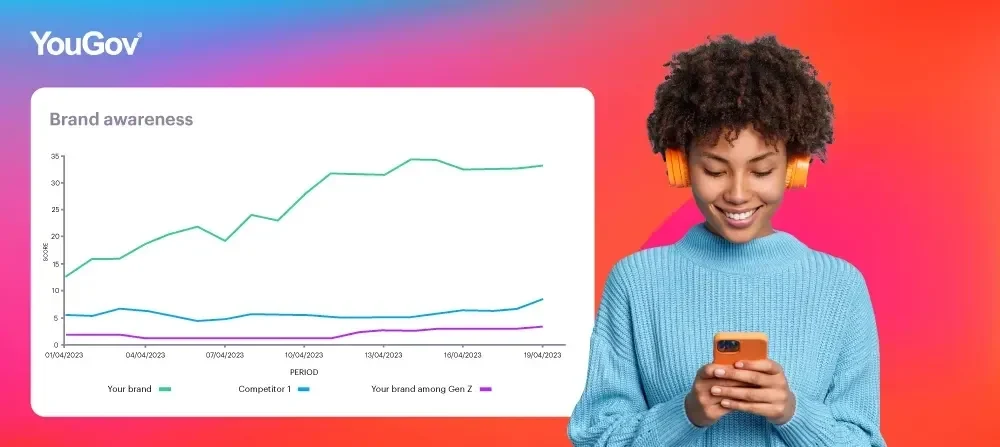Your brand is the foundation of your business, influencing everything from customer perception to market share. But what exactly makes a successful brand, and how do you go about building and measuring its success?
Success starts with understanding how real people experience your brand. Measurable, quality-assured data gives you that clarity - showing where your brand connects, where it can grow, and how it performs in the market.
This guide explores the core elements of a strong brand, outlines key metrics for measuring brand health, and links to practical resources to help you build a brand that resonates with your target audience - and stands up to real-world scrutiny.
What is a brand?
A brand is much more than just a company logo or a product label. It's the sum of all the experiences, emotions, and perceptions that a consumer has about a particular product, service, or organization. It's the story you tell, the values you represent, and the personality you project.
Every strong brand starts with clarity - and that clarity comes from understanding reality. It’s not how you hope to be seen, but how people actually see and talk about you. Reliable, representative data helps you close the gap between perception and intention.
Think of your brand as a person you want your customers to trust - what values define them, how do they communicate, and what kind of experience do they leave behind?
Strong brands do more than look good - they create meaning and consistency rooted in trust and real experiences.
Here's why a strong brand goes beyond the surface:
Emotional connection
Strong brands build trust and loyalty by connecting with consumers on an emotional level. They evoke feeling - happiness, security, or belonging - building emotional equity that lasts.
Differentiation
In a crowded marketplace, a strong brand helps you stand out from the competition. It clarifies what makes you different and why people choose you.
Building a strong brand
A strong brand is a powerful, measurable asset. From driving loyalty and advocacy to growing sales and share, building your brand on verified insight - not assumptions - provides a solid foundation for long-term success.
Here are the key elements to consider:
Identity
The core essence of your brand - its values, beliefs, and purpose. This shapes everything from design and tone to how you treat customers.
Messaging
Your brand message is the story you want to tell the world. It should be clear, concise, and consistent across all your communication channels. It should also resonate with your target audience and connect with their needs and desires.
Positioning
This is all about how you want your brand to be perceived in the marketplace. Where do you fit in compared to your competitors? What unique value proposition do you offer?
Experience
Every touchpoint a customer has with your brand contributes to their overall experience. This includes everything from their initial interaction with your website to their post-purchase interactions.
Data should inform every aspect of brand building. When you understand real experiences through continuous feedback and validated data, you can refine messaging, creative, and delivery with confidence.
By focusing on these core elements, you can build a strong brand that connects with your target audience, fosters trust, and drives business success.
Measuring your brand’s health

Measuring brand health reveals how your brand performs in the real world - how people think, feel, and talk about you. It’s the foundation for continuous improvement and sustainable growth.
Brand health tracking
Brand health tracking involves assessing various brand health metrics to establish a complete picture of your brand’s current position and where it could improve.
The happier your customers, the stronger your brand health. If you’re delivering on your promises, you’ll perform well across brand health metrics.
Core brand health metrics
Core brand health metrics include Advertising Awareness, Net Promoter Score (or Recommendation), Word of Mouth, Purchase Intent, Consideration, Customer Satisfaction, Quality, Value and more. These metrics are designed to evaluate every stage of the consumer purchase funnel, and your media and communications profile.
Measuring these metrics usually involves brand research through online surveys or questionnaires, social listening tools and qualitative research with focus groups. An effective brand health survey measures sentiments and responses from your current audience, target customers and the general population, providing insights into what they think, feel, and say about your brand.

To help you build a data-driven brand strategy, explore these related guides. Each offers practical insight into a different aspect of brand success - from awareness and perception to advocacy and performance:
- How to measure brand awareness: Learn how to measure, track, and understand brand awareness - using reliable data to reveal how visible and memorable your brand is among real consumers.
- How to track your brand health: Explore how daily tracking and verified metrics combine to provide a true view of brand performance and campaign effectiveness.
- Six ways to grow your brand with custom research: Discover how high-quality custom research strengthens brand strategy, optimizes customer experience, and uncovers actionable insights.
- How do you measure the value of a product placement? Understand how to assess the true value of product placements through evidence-based methods like advertising value equivalency and YouGov’s Placement Quality Scoring (PQS).
- Are in-game brand activations worth it? Learn why in-game brand activations are so powerful and explore best practices for planning and measuring results.
- Global Best Brands 2025: Discover the world’s most loved consumer brands, ranked by more than one million verified consumer surveys across 28 markets.
We aspire to be the leading European telecommunications provider. YouGov BrandIndex provides essential insights for making the right decisions for expanding the brand.
